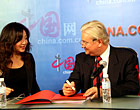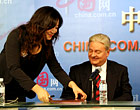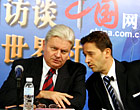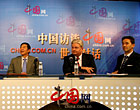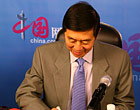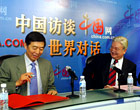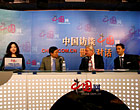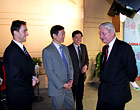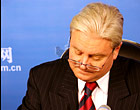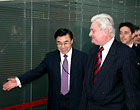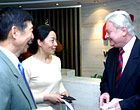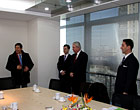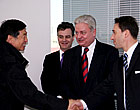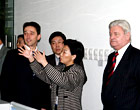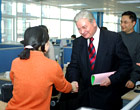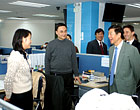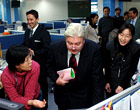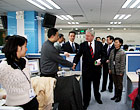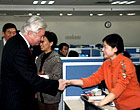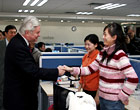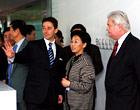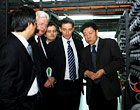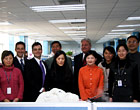| Tools: Save | Print | E-mail | Most Read |
| Ambassador Optimistic on China-France Ties |
| Adjust font size: |
France is prepared to strengthen its ties with China in all areas as the two countries pursue a joint interest in shared technology and new market development, Hervé Ladsous, the newly appointed French Ambassador to China, said yesterday afternoon. Ladsous delivered his views on China-France relations while conducting an interview with the China Internet Information Center (CIIC, m.formacion-profesional-a-distancia.com). Wu Jianmin, president of the Beijing-based China Foreign Affairs University and chairman of the Bureau of International Expositions, also participated in the program broadcast live on the web. Wu is a senior diplomat, previously serving as Chinese Ambassador to France from November 1998 to July 2003. France and China have a common background in many ways, for both countries have a long history and brilliant cultures, Ladsous explained during the interview. In the past two years, leaders of both nations have exchanged frequent state visits. To boost mutual understanding the two countries hosted the "Year of China in France" (2003-04) and the "Year of France in China" (2004-05) respectively, achieving great success. Deepening bilateral ties will be mutually beneficial, Ladsous said. To aid in this endeavor, he suggested that similar cultural exchange events be held regularly. Despite the busy schedule in this election year, French leaders are still eager to strengthen ties with China. There were a total of 23,000 Chinese students studying in France in 2005; however, Ladsous said it, was far from satisfactory, pledging to attract more Chinese students. The rising bilateral trade volume in 2006 pleased the French ambassador, but he stressed the importance of looking beyond the figures to find the true gain. About 1,300 French enterprises achieved a turnover of US$20 billion in 2005, creating a significant number of new jobs for Chinese people. For example, Carrefour is expected to open 100 stores throughout China in the near future, creating about 40,000 jobs. He said that the two countries already had a good partnership, citing the Airbus assembly line in Tianjin and nuclear power plants in Guangdong as prime examples. He expects to see future cooperation in such industries as agricultural processing and food. Ladsous suggested that France-China ties be strengthened in all aspects, especially in the field of environmental protection. He also hopes that France and China can join their efforts in tapping new markets such as the Middle East and Africa. Technological cooperation is a key part of globalization, according to Ladsous. He encouraged French enterprises and labs to find joint programs and new markets in China, and promised to personally promote this strategy for new development. Wu Jianmin, however, believes that China and France are mutually complementary in their economies. Although "trade frictions" are highlighted in the media recently, the concerned trade value is only a small percentage of bilateral trade volume, he said. Wu refuted the belief that sweeping Chinese commodities take jobs from French citizens, claiming such ideas will not help bilateral relations. During the interview, Ladsous responded to a question from an online viewer concerning the quality of life in China as compared to France. A list of living quality indexes recently released by a US travel magazine shows that France has topped the list for two consecutive years, while China ranked 116th among 195 nations. Ladsous said that such a ranking was very subjective. China indeed needs to solve some problems like environmental protection, but there are still many comfortable and beautiful places to live. He believes China will catch up with France soon. Before the online interview, the ambassador visited the new CIIC office and talked with the staff of the French department of the website. Joining him from the French Embassy were Olivier Guyonvarch, counselor of press and communication, and Bruno Gensburger, counselor of communication and interpretation.
(China.org.cn by Tang Fuchun and Li Shen, February 1, 2007) |
| Tools: Save | Print | E-mail | Most Read |
 |
| Related Stories |
|
Product Directory China Search |
Country Search Hot Buys |

